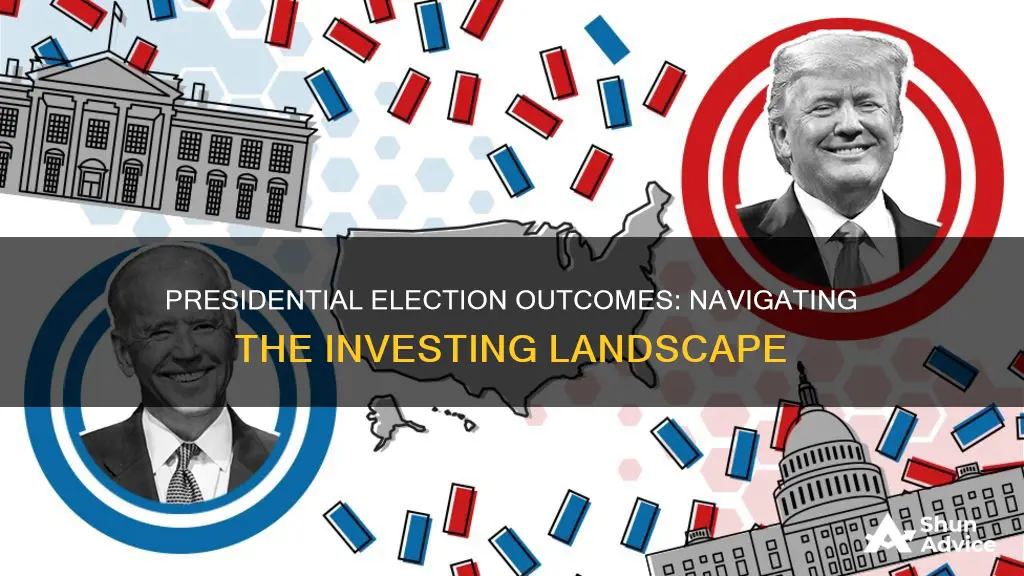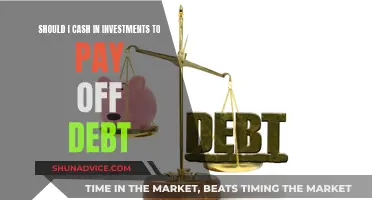
The upcoming US presidential election has investors wondering how the results will affect their portfolios. While elections can have significant implications for the country's direction, historical data suggests that the impact on the stock market is minimal.
Analysts have found that the stock market's performance is usually muted in the 12 months leading up to the election. This is true for both the equities market and bond markets. Equities gain less than 6% on average, while bonds tend to deliver returns of about 6.5%.
However, in the 12 months after an election, the market's performance tends to be stronger than usual, regardless of the winning party. This is because markets are nonpartisan, and portfolio positioning should be dictated by a long-term plan rather than current events.
While the election may not significantly impact overall market performance, different sectors react differently to the uncertainty and results. For example, the healthcare and energy sectors can show great volatility during elections, while the tech industry has shown considerable steadiness.
Investors should focus on well-informed, strategic planning and diversification to reduce the risks associated with election-driven market volatility.
What You'll Learn

The impact of election outcomes on markets
Volatility and uncertainty
During election times, financial markets are famously erratic and unpredictable as investors negotiate the possibility of major policy changes and economic upheaval. The expectation of a new government fuels a frenzy of conjecture that causes market swings capable of upsetting even the most experienced investors. Election cycles are typically characterised by more volatility.
Historical trends
Examining stock market behaviour during prior U.S. presidential elections exposes clear trends that frequently show up before and following major events. Historical evidence shows that markets often show more volatility in the months before an election since uncertainty about the policies of the upcoming administration generates a cautious investing environment.
For example, the S&P 500 slumped significantly in the months before the 2008 election, mostly in response to the global financial crisis but also in part because of the uncertainty about the candidates' crisis management strategies. The market initially stayed erratic following the election but settled as the new government's ideas started to take shape.
Similar market swings occurred in the 2016 election; the Dow Jones Industrial Average dropped sharply on election night as results started to support Donald Trump, then recovered and surged in the next few days as investors expected pro-business policies.
Psychological impact on investors
Elections provide a great deal of uncertainty, which can cause emotional and usually illogical behaviour. Anxiety and fear over possible policy changes might drive investors to either make hurried investment decisions or withdraw from the market early on, hence increasing the volatility.
For instance, the surprising result of the 2016 U.S. presidential contest sent up a tsunami of panic selling that reflected the initial shock of the market. But as analysts evaluated the expected economic policies of the new government, the market mood changed drastically and there was a notable comeback.
Sector-specific volatility and stability
Different sectors react differently to the uncertainty and results of elections; some display more volatility while others remain rather constant.
Healthcare
Especially when candidates suggest big changes to healthcare policies, this industry sometimes shows great volatility during elections. For example, as investors considered the possible effects of different healthcare policies from the contenders, healthcare stocks swung drastically in the 2020 contest.
Energy
Particularly with respect to policy on fossil fuels and renewable energy, the sector is quite susceptible to election results. For instance, energy stocks surged in expectation of Trump administration pro-oil policies and deregulation.
Technology
Historically, during election times, the tech industry has shown considerable steadiness and fortitude. Still, policy ideas—like rules on data privacy or antitrust actions—can have an impact on this industry. Concerns about more regulation gave tech stocks some volatility during the 2020 election.
Financials
Financial stocks are also quite sensitive to election results. The financial crisis caused initial declines in financial equities following the 2008 election, but as the new government carried out stabilization policies, they eventually rebounded.
Impact of election outcomes
Various election results can cause different degrees of market disturbance.
Changes in political parties
Markets usually react strongly when the power of the government moves between parties with different economic philosophies. For example, sector-specific volatility can result from a pro-business administration changing to one emphasizing regulatory reform. Anticipated tax cuts and deregulation drove a spike in markets following the 2016 U.S. election, which produced a Republican president and Congress.
Unexpected election events
Markets especially react sensitively to such events. One outstanding example is the 2016 American presidential contest. Market projections and polls mostly projected a different conclusion; when the actual results deviated from these expectations, markets underwent instantaneous and major upheaval. Following the initial decline in futures markets, investors quickly recovered as they considered the ramifications of the policies of the new government.
Legislative balance shifts
Though the presidency stays with the same party, major changes in Congress's makeup could affect market attitudes. A change towards a more evenly split or opposing Congress, for example, can cause parliamentary deadlock, therefore influencing the execution of economic policy and generating more uncertainty.
Strategic investment approaches
Diversification is one of the best ways to reduce the risks connected with election-driven market volatility. Investors can lower their exposure to any one source of risk by spreading investments throughout many asset classes, sectors, and locations. This method guarantees that stability or gains in one area balance a negative effect in another. For instance, a well-diversified portfolio including technology, consumer basics, and international markets can help offset the impact should possible legislative changes severely impact the healthcare industry.
Hedging is another strategy to protect against possible losses. Purchasing put options lets investors hedge their portfolios; their value rises as the underlying asset lowers. Inverse ETFs, which move opposite the market, also help to reduce negative risks.
Military Personnel: Investing for the Future
You may want to see also

The psychological impact of elections on investors
Elections can have a significant psychological impact on investors, causing heightened emotions and uncertainty. This can lead to anxiety and fear over possible policy changes, resulting in rushed investment decisions or early withdrawals from the market, increasing volatility.
The outcome of an election can send shockwaves through the market, as was seen in the 2016 US election, where the surprising result caused a wave of panic selling that reflected the market's initial shock. However, as analysts evaluated the expected economic policies of the new government, the market mood changed, and a notable comeback occurred.
This trend has also been observed in other major economies, such as the UK's Brexit vote in 2016, which caused sharp declines in the FTSE 100 as investors grappled with uncertainty.
The psychological effects of elections on investors can lead to:
- Increased market volatility
- Emotional and illogical behaviour
- Rushed investment decisions or early withdrawals
- Heightened uncertainty
To manage these psychological impacts, investors can:
- Diversify their portfolios to reduce exposure to any one source of risk
- Hedge their portfolios using financial products like inverse ETFs, options, or futures
- Move assets to more defensive stocks or sectors that offer stable performance and are less sensitive to political shifts
- Adjust their tactical asset allocation by increasing exposure to safe havens like gold or premium corporate bonds
- Maintain a long-term investment view and avoid making impulsive short-term decisions
Strategic Retirement: Investing $200K for a Secure Future
You may want to see also

Sector-specific volatility and stability
Different sectors react differently to the uncertainty and results of elections; some display more volatility while others remain rather constant.
Healthcare
Especially when candidates suggest big changes to healthcare policies, this industry sometimes shows great volatility during elections. For example, as investors considered the possible effects of different healthcare policies from the contenders, healthcare stocks swung drastically in the 2020 contest.
Energy
The energy sector is quite susceptible to election results, particularly with respect to policy on fossil fuels and renewable energy. For instance, energy stocks surged in expectation of Trump administration pro-oil policies and deregulation.
Technology
Historically, during election times, the tech industry has shown considerable steadiness and fortitude. Still, policy ideas—like rules on data privacy or antitrust actions—can have an impact on this industry. Concerns about more regulation gave tech stocks some volatility during the 2020 election.
Financials
Financial stocks are also quite sensitive to election results, particularly in response to legislative changes. The financial crisis caused initial declines in financial equities following the 2008 election, but as the new government carried out stabilization policies, they eventually rebounded.
The Ethical Retirement Conundrum: Navigating a Moral Minefield
You may want to see also

Risk factors associated with elections
Elections present several risk factors that investors should be aware of:
- Policy uncertainty: The opposing economic and regulatory ideas presented during election campaigns create uncertainty about the direction of the next government's policies. This uncertainty can cause market volatility as investors try to project and respond to possible results.
- Regulatory changes: Different political parties have different views on rules impacting sectors such as finance, healthcare, energy, and technology. A change in administration can result in deregulation in some sectors while increasing regulations in others, which can have varying effects on different industries.
- Government spending priorities: Elections can result in changes in government spending priorities, which can positively or negatively impact specific sectors. For example, cuts to healthcare spending could hurt that sector, while increased infrastructure spending could benefit building and materials industries.
- Changes in political parties: Markets tend to react strongly when power shifts between parties with different economic philosophies. A shift from a pro-business administration to one emphasizing regulatory reform, for instance, can result in sector-specific volatility.
- Unexpected election events: Markets are sensitive to unexpected election outcomes. When actual results deviate from projections and polls, markets can undergo instantaneous and major upheaval.
- Legislative balance shifts: Changes in the makeup of Congress, even if the presidency stays with the same party, can affect market attitudes. A shift towards a more evenly split or opposing Congress can cause parliamentary deadlock, influencing economic policy execution and generating uncertainty.
Inflation-Proof Retirement: Navigating Investments in Uncertain Times
You may want to see also

Tips for investors during election seasons
- Diversify your portfolio: Build a portfolio with a mix of different securities and investments in a variety of industries to protect your investments if the market fluctuates.
- Use dollar-cost averaging: This strategy involves investing a fixed amount of cash into an investment at regular intervals to lower your investment costs while maximising your returns.
- Focus on long-term investments: Remember that you are investing for long-term goals, and short-term fluctuations won't have lasting effects.
- Take advantage of higher interest rates: Move your emergency fund to a high-yield savings account or cash management account.
- Meet with a financial advisor: Consult an expert if you are worried about your portfolio not being properly diversified or if you have the wrong allocation for your needs, time frame, and risk tolerance.
- Historically, the market produces lower returns in the year preceding a presidential election but tends to recover and outperform in the following 12 months.
- It is important to maintain a proper perspective when assessing the potential impact of elections on capital markets and your investments.
- Markets are non-partisan, and portfolio positioning should generally be dictated by a long-term plan rather than by current events.
- Betting on specific policy or sector impacts can be highly risky, as it is challenging to predict which party will win and what the exact consequences will be.
Renewables: Why the Reluctance?
You may want to see also
Frequently asked questions
Presidential elections can cause volatility in the market as investors deal with uncertainty about the country's direction. However, historical data shows that the stock market has generally continued to rise in election years.
Investors should avoid anticipating election outcomes and instead focus on their long-term investment plans.
No. Even if the election shakes up the stock market, there is an opportunity cost to cashing out. Data shows that investors who stay invested through a presidential election year tend to come out on top.
It depends on your circumstances. If you're planning to make a big purchase within the next two years, such as a house, or if you're retiring soon, it may be wise to increase your cash reserves.
Diversifying your portfolio is crucial during periods of volatility. Building a portfolio with a mix of different securities and investments in a variety of industries will protect your investments if the market fluctuates.







